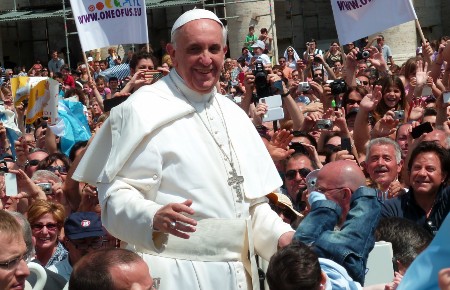 Hi readers, it seems you use Catholic Online a lot; that's great! It's a little awkward to ask, but we need your help. If you have already donated, we sincerely thank you. We're not salespeople, but we depend on donations averaging $14.76 and fewer than 1% of readers give. If you donate just $5.00, the price of your coffee, Catholic Online School could keep thriving. Thank you. Help Now >
Hi readers, it seems you use Catholic Online a lot; that's great! It's a little awkward to ask, but we need your help. If you have already donated, we sincerely thank you. We're not salespeople, but we depend on donations averaging $14.76 and fewer than 1% of readers give. If you donate just $5.00, the price of your coffee, Catholic Online School could keep thriving. Thank you. Help Now >
Maestro di Camera del Papa
FREE Catholic Classes
In former times there were four so-called palace prelates ( prelati palatini ):
- the Major Domo;
- the Maestro di Camera;
- the Auditor to the pope ; and
- the Master of the Sacred Palace .
The maestro di camera is the real chief chamberlain. His authority extends over all matters concerning the daily personal service of His Holiness. He is the immediate superior of all the chamberlains, both clerical and lay; he has charge of the service of the Anticamera as regards the four acting clerical privy chamberlains; he informs the orderly officer of the Noble, Swiss, and Palace Guards respectively, of the hours of duty for the next day; he summons the privy and honorary lay chamberlains to their period of weekly service, and dismisses them at the end of it. All petitions for audiences are lodged with him, whether they are presented to him immediately or whether they are presented to him (in diplomatic language) mediately , by the Secretary of State. He issues the summonses to audiences, and regulates all occasional, unusual, or unofficial ceremonies, such as the reception of pilgrimages and the like. Being in daily personal touch with the pope, he receives his orders concerning the Anticamera of the next day, and makes arrangements accordingly. As supernumerary Prothonotary Apostolic he is always at the head of this college of prelates, irrespective of the date of his appointment. At papal audiences and on other occasions when the pope sits upon his throne without pontifical vestments, the major domo stands on the right, the maestro di camera on the left, both on the second step of the throne. The extent of this prelate's jurisdiction is limited exclusively to the reception rooms of the pope. He also has some ancient privileges, which may be read of in Humphrey, "Urbs et Orbis".
 Hi readers, it seems you use Catholic Online a lot; that's great! It's a little awkward to ask, but we need your help. If you have already donated, we sincerely thank you. We're not salespeople, but we depend on donations averaging $14.76 and fewer than 1% of readers give. If you donate just $5.00, the price of your coffee, Catholic Online School could keep thriving. Thank you. Help Now >
Hi readers, it seems you use Catholic Online a lot; that's great! It's a little awkward to ask, but we need your help. If you have already donated, we sincerely thank you. We're not salespeople, but we depend on donations averaging $14.76 and fewer than 1% of readers give. If you donate just $5.00, the price of your coffee, Catholic Online School could keep thriving. Thank you. Help Now >








 Daily Readings for Friday, April 26, 2024
Daily Readings for Friday, April 26, 2024 St. Cletus: Saint of the Day for Friday, April 26, 2024
St. Cletus: Saint of the Day for Friday, April 26, 2024 Prayer before the Closing of the Day: Prayer of the Day for Friday, April 26, 2024
Prayer before the Closing of the Day: Prayer of the Day for Friday, April 26, 2024


